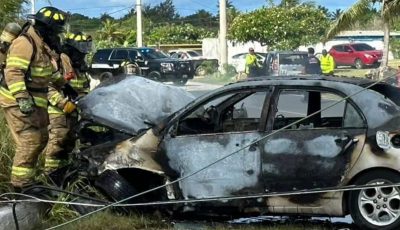Justices hear Crisostomo’s appeal to reverse ‘ice’ conviction
The CNMI Supreme Court placed under advisement yesterday Joseph A. Crisostomo’s appeal to reverse his conviction on a count of illegal possession of methamphetamine or “ice.”
Chief Justice Alexandro C. Castro and Associate Justices John A. Manglona and Perry B. Inos heard Crisostomo’s appeal.
Assistant public defender Michael A. Sato argued as counsel for Crisostomo. Assistant attorney general Margo Brown-Badawy argued for the government.
Crisostomo was convicted in February this year of possession of methamphetamine and criminal contempt. Associate Judge Joseph N. Camacho sentenced him to the maximum of five years and six months without the possibility of parole.
Crisostomo, through Sato, appealed to the CNMI Supreme Court.
The issue that Sato presented was whether the Superior Court erred in finding reasonable suspicion for a traffic stop, when the police officers initiated the stop without any objective reasons for suspecting wrongdoing. The officers detained and conducted a search of Crisostomo, which Sato said was a violation of his client’s Fourth Amendment right.
The other issue that Sato presented was whether the Superior Court erred by admitting the evidence recovered as a result of the search on Crisostomo, when that evidence was obtained pursuant to an unlawful search that violated defendant’s Fourth Amendment right to be free from unreasonable searches and seizures.
On Jan. 11, 2012 at 3:17am, police officers Tyrone Teregeyo and T. J. Yangetmai were conducting a routine check at a secluded beach area in Susupe, Saipan. The area is routinely checked by the police because it is known for drug related crime. As the officers turned into the dirt road aboard a marked police vehicle, a Toyota Tercel that was parked in the middle of the one-lane road turned on its engine and headlights.
The car sped directly toward the officers’ vehicle, almost causing a head-on collision. The officers searched the backseat of the vehicle and found a glass tube suspected to be drug paraphernalia. Crisostomo, who was a passenger, and his companion were arrested for possession of less than a gram of “ice.”
Sato argued, among other things, that the trial court erred by finding reasonable suspicion for the traffic stop because the police officer was unable to articulate objective reasons that meet a totality of the circumstances test to establish reasonable suspicion of legal wrongdoing to justify the officer’s decision to initiate the stop of Crisostomo’s vehicle.
Sato said there were no specific indicators of criminal conduct that would justify the police officer’s detention of Crisostomo.
“In the absence of reasonable suspicion of criminal activity, the Fourth Amendment protects individuals from police detention without a warrant,” said Sato in the opening brief.
Sato said the search of Crisostomo’s vehicle and person violated the Fourth Amendment protection against unreasonable searches and seizures, requiring suppression.
Sato said the trial court erred by allowing the evidence to be introduced into evidence at the trial.
The defense counsel said the vehicle was not free to leave the area and the vehicle did not commit a traffic offense authorizing a traffic stop.
Sato said Crisostomo did not try to escape as he and his companion did not run away, but just stayed in the vehicle.
Sato said the place cannot be characterized as a crime area as there is no data to support this characterization.
Assistant attorney general Brown-Badawy said the high court should uphold Crisostomo’s conviction for possession of a controlled substance.
Brown-Badawy said police officers Teregeyo and Yangetmai had multiple reasons to develop a reasonable suspicion of criminal activity as Crisostomo was in a place believed to be a high-crime area at a highly unusual time, 3:17am.
Brown-Badawy said that looking at the totality of the circumstances, officers were reasonable in suspecting that a crime was occurring, and were justified in conducting an investigatory detention.
The prosecutor cited several previous court rulings to support the government’s arguments.
The government argued that, although warrantless searches are generally unconstitutional, the automobile exception applies to justify the search in this case.
The prosecutor said upon conducting an investigatory detention, officers saw drug paraphernalia in plain view.
The government, argued, among other things, that the officers had probable cause to believe that Crisostomo had concealed additional evidence in the car.
Crisostomo, 41, is currently serving life imprisonment for kidnapping, raping, killing, and robbing bartender Emerita R. Romero. He is also appealing his conviction in that case.


























